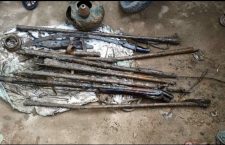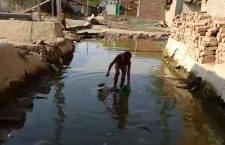Three members from Mahari’s family including her son, daughter and her own self had taken part in NREGA’s work this year in their village of Bambiya of Tindwari block in Banda, UP. It has been more than five months and they are yet to receive their payments of Rs 5,000 each.
“They say the government has not yet released the money, how can we distribute your payments?” said Mahari, when asked of what the Pradhan and Panchayat Mitra of the village had to say on the matter. Receiving the payments on time were crucial for them this year, she said “We spent so much money on building our house and now we don’t have anything left for our daughter’s wedding. We had worked so hard, working till 8 and 9 pm every day at the worksite. “

NREGA worker Mahari
Many more families such as theirs have also been patiently awaiting their compensation for building a village pond, six months ago as part of the last NREGA work. Each worker has to receive amounts in the range of 3-6,000 each.
Almost everyone claims that the pradhan is not giving the money and the Panchayat Mitra is not putting the money into their accounts. Rambaran, an aged resident of Bambiya says that he has never had to work this long for NREGA payments before. He has previously worked on many more projects such as ponds, wells and RCC roads.

NREGA worker Sunaina.
Sunita, another resident who had also gone for NREGA work, had not even received a job card to attest for her participation. When asked how she remembers the number of her work days she says, “I have filled in my attendance every day and kept a count.” She also shared that people had pursued the pradhan so relentlessly for payments that he sometimes gives them 100-200 at a time. She said, “Once I had asked him for Rs 500. But when he gave me Rs 300, I handed it back finding it insulting”
Sunaina, another worker awaiting her payment surmised everyone’s exasperation “They are big folks, who are we to fight?”

NREGA Worker Sunita.
Delayed payments, missing job cards and foul play by local authorities aside, there seem to be newer factors at play lately, in wage payments not reaching the hands of MGNREGA workers. Many villagers had pointed out how the payments are ‘put into their Aadhaar cards or into their SIM cards’ these days.
When contacted, the pradhan of the village, Budhh Vilas only repeated the same claim of the money not having been transferred from Lucknow. Dharmendra Kumar, the panchayat mitra, offered a more detailed explanation, “The money hasn’t yet come from above.”
Regarding the change in the payments systems, he said, ”Earlier we used to send the demand draft for the total amount to be paid out to all based on the total number of work days as calculated in the computerized attendance records. Once the cheque arrived, we would deposit it in the bank and the money would get distributed according to each person’s share. Now it is different. The money sometimes goes into the Aadhaar cards and sometimes into their SIM cards, one can never be sure.”
his ‘new system’ referred to, of money going into Aadhaar cards or SIM cards, is one that came into force as a result of a directive issued by the Ministry of Rural Development in 2014 that it is mandatory for all NREGA workers to link their Aadhaar numbers with their bank accounts in order to receive their wages. The Department of Telecommunications had also issued a directive in the same year that SIM card owners and new applicants would have to enter their Aadhaar numbers in order to verify their identities.
All these were a part of the government’s Direct Benefit Transfer mission of delivering state benefits directly into Aadhaar link bank accounts. But it also meant that it is difficult to keep track of where one’s money is going if one has multiple bank accounts. The UIDAI guidelines say that the last registered account that is linked to Aadhaar would automatically be the account where transfers, benefits, and payments would go into.
It also means that if one were to link their Aadhaar number with a new Airtel SIM, the Airtel Payments Bank would become default account, most often without one’s knowledge or consent. What has complicated the matter further is that after the ‘Right to Privacy’ was upheld by the Supreme Court in August 2018, in the case of Aadhaar cardholders, the registered bank account numbers of NREGA cardholders have now been erased from the NREGA website, leaving no means to track into which account one’s money has gone.
Uttar Pradesh’s dismal record of generating only 64.17% of the timely generation of pay orders under NREGA along with the new systems in place for more “efficient“ transfer of funds has only compounded the problems of NREGA workers. The Lok Sabha recently pushed the Aadhaar Amendment Bill to comply with the latest Supreme Court judgement, which may hopefully resolve cases such as in Bambiya village.
As for what people can do now to trace where their money has gone and what is being done to help them, Dharmendra Kumar said, “There’s a code which tells you where the money has gone. And if the money has gone to their phone, they will get it from Banda town, not here.”
“Only the educated can understand this enough to seek out their wages from the right sources. What about, says an illiterate woman?” our reporter asked him. To this, his response was simply, “They should take someone along then. “
This Khabar Lahariya article first appeared in The Wire

